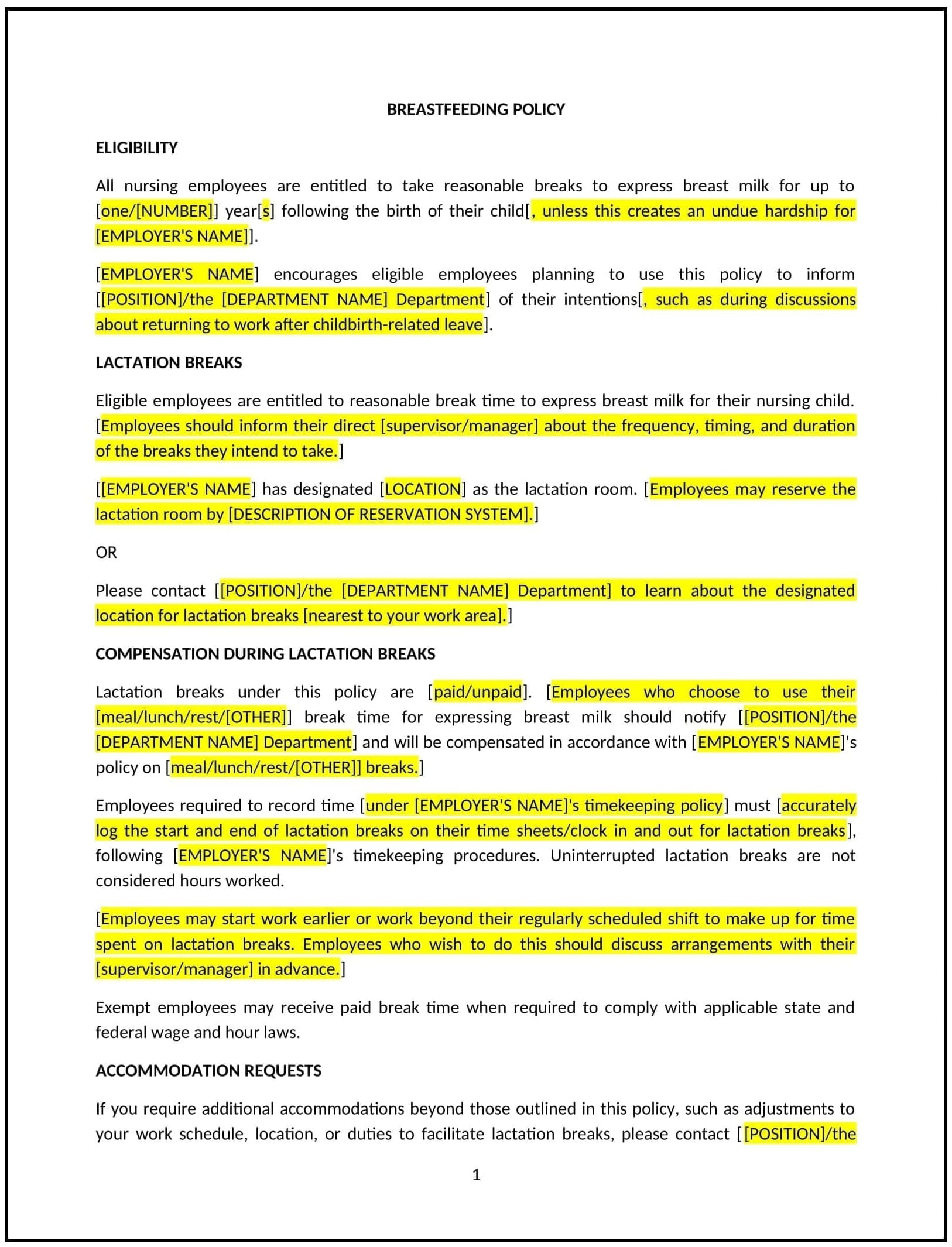Breastfeeding break policy (Montana): Free template
Got contracts to review? While you're here for policies, let Cobrief make contract review effortless—start your free review now.

Customize this template for free
Breastfeeding break policy (Montana)
A breastfeeding break policy helps Montana businesses provide nursing employees with reasonable break time and a private space to express milk during work hours. This policy outlines the rights of nursing employees, the responsibilities of employers, and the accommodations businesses should provide to support lactating employees.
By implementing this policy, businesses can create a supportive work environment, promote employee well-being, and help nursing employees balance work and family responsibilities.
How to use this breastfeeding break policy (Montana)
- Define eligibility: Businesses should specify which employees are eligible for breastfeeding breaks, including full-time, part-time, and temporary workers. The policy should clarify that nursing employees may take breaks as needed.
- Provide reasonable break time: Businesses should allow nursing employees sufficient time to express milk, recognizing that needs may vary. The frequency and duration of breaks should be flexible based on individual circumstances.
- Designate a private lactation space: Businesses should provide a clean, private, and non-bathroom space for employees to express milk. The space should have seating, an electrical outlet, and a door that can be locked for privacy.
- Communicate scheduling expectations: Employees should coordinate breastfeeding breaks with their supervisor when possible to minimize workplace disruptions. However, businesses should ensure that employees are not pressured to limit their break time.
- Address storage of expressed milk: Businesses should allow nursing employees to store expressed milk in a personal cooler or a designated refrigerator, if available. Clear guidelines should be provided to ensure milk storage remains safe.
- Prohibit discrimination or retaliation: Businesses should make it clear that nursing employees will not face negative treatment or retaliation for taking breastfeeding breaks. Managers and coworkers should be informed of these protections.
- Review and update regularly: Businesses should periodically assess the policy to ensure it remains relevant and aligns with best practices for workplace accommodations.
Benefits of using this breastfeeding break policy (Montana)
This policy provides several key benefits for Montana businesses:
- Supports employee health and well-being: Providing breastfeeding breaks helps nursing employees manage their health and infant care needs while at work.
- Promotes workplace inclusivity: A structured policy ensures all nursing employees have access to reasonable accommodations without fear of discrimination.
- Improves employee retention: Businesses that support working parents are more likely to retain employees after parental leave, reducing turnover costs.
- Enhances workplace morale: Employees who feel supported are more engaged, productive, and satisfied with their work environment.
- Provides clear expectations: Establishing a formal policy reduces confusion about breastfeeding accommodations and standardizes the process across the workplace.
- Encourages compliance with best practices: Businesses that adopt supportive lactation policies contribute to a family-friendly workplace culture.
Tips for using this breastfeeding break policy (Montana)
- Communicate the policy clearly: Businesses should inform employees of their right to breastfeeding breaks and the process for requesting accommodations.
- Provide training for managers: Supervisors should be trained on how to handle breastfeeding break requests with sensitivity and professionalism.
- Ensure privacy in lactation spaces: Businesses should provide a private, comfortable, and accessible space for nursing employees to express milk.
- Offer flexibility in scheduling: Businesses should work with nursing employees to accommodate their needs without creating unnecessary work disruptions.
- Maintain a supportive workplace culture: Employees should be encouraged to respect the needs of nursing coworkers and avoid creating stigma around breastfeeding breaks.
- Review and improve accommodations: Businesses should periodically assess lactation support measures and make adjustments based on employee feedback.